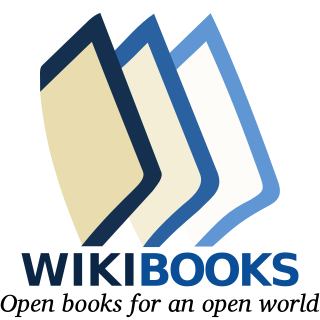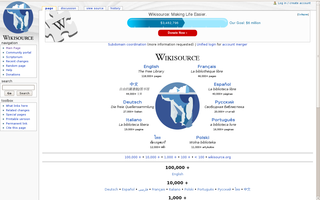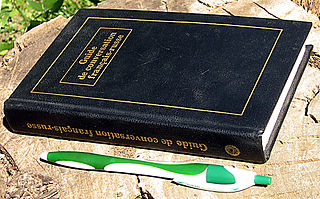A translation memory (TM) is a database that stores "segments", which can be sentences, paragraphs or sentence-like units that have previously been translated, in order to aid human translators. The translation memory stores the source text and its corresponding translation in language pairs called “translation units”. Individual words are handled by terminology bases and are not within the domain of TM.

A Creative Commons (CC) license is one of several public copyright licenses that enable the free distribution of an otherwise copyrighted "work". A CC license is used when an author wants to give other people the right to share, use, and build upon a work that the author has created. CC provides an author flexibility and protects the people who use or redistribute an author's work from concerns of copyright infringement as long as they abide by the conditions that are specified in the license by which the author distributes the work.

Wikibooks is a wiki-based Wikimedia project hosted by the Wikimedia Foundation for the creation of free content digital textbooks and annotated texts that anyone can edit.

Wikisource is an online digital library of free-content textual sources on a wiki, operated by the Wikimedia Foundation. Wikisource is the name of the project as a whole and the name for each instance of that project ; multiple Wikisources make up the overall project of Wikisource. The project's aim is to host all forms of free text, in many languages, and translations. Originally conceived as an archive to store useful or important historical texts, it has expanded to become a general-content library. The project officially began on November 24, 2003 under the name Project Sourceberg, a play on the famous Project Gutenberg. The name Wikisource was adopted later that year and it received its own domain name.

Open educational resources (OER) are teaching, learning, and research materials intentionally created and licensed to be free for the end user to own, share, and in most cases, modify. The term "OER" describes publicly accessible materials and resources for any user to use, re-mix, improve, and redistribute under some licenses. These are designed to reduce accessibility barriers by implementing best practices in teaching and to be adapted for local unique contexts.

A phrase book or phrasebook is a collection of ready-made phrases, usually for a foreign language along with a translation, indexed and often in the form of questions and answers.

According to the Wikimedia Foundation, the Wikimedia movement is the global community of contributors to the Wikimedia projects. This community directly builds and administers the projects. It is committed to using open standards and software.
OpenStax CNX, formerly called Connexions, is a global repository of educational content provided by volunteers. The open source platform is provided and maintained by OpenStax, which is based at Rice University. The collection is available free of charge, can be remixed and edited, and is available for download in various digital formats.
AGROVOC is a multilingual controlled vocabulary covering all areas of interest of the Food and Agriculture Organization of the United Nations (FAO), including food, nutrition, agriculture, fisheries, forestry and the environment. By November 2021, the vocabulary consisted of over 39,600 concepts with up to 924,000 terms in up to 41 different languages. It is a collaborative effort, edited by a community of experts and coordinated by FAO. AGROVOC is made available by FAO as an RDF/SKOS-XL concept scheme and published as a linked data set aligned to 20 other vocabularies.
Agricultural Information Management Standards, abbreviated to AIMS is a space for accessing and discussing agricultural information management standards, tools and methodologies connecting information workers worldwide to build a global community of practice. Information management standards, tools and good practices can be found on AIMS:
Grammatical Framework (GF) is a programming language for writing grammars of natural languages. GF is capable of parsing and generating texts in several languages simultaneously while working from a language-independent representation of meaning. Grammars written in GF can be compiled into a platform independent format and then used from different programming languages including C and Java, C#, Python and Haskell. A companion to GF is the GF Resource Grammar Library, a reusable library for dealing with the morphology and syntax of a growing number of natural languages.

Wikivoyage is a free web-based travel guide for travel destinations and travel topics written by volunteer authors. It is a sister project of Wikipedia and supported and hosted by the same non-profit Wikimedia Foundation (WMF). Wikivoyage has been called the "Wikipedia of travel guides".
UniLang or UniLang Community is a multilingual online collaboration website, with online language resources publicly accessible.
A Rights Expression Language or REL is a machine-processable language used to express intellectual property rights and other terms and conditions for use over content. RELs can be used as standalone expressions or within a DRM system.

Tatoeba is a free collection of example sentences with translations geared towards foreign language learners. Its name comes from the Japanese phrase "tatoeba" (例えば), meaning "for example". It is written and maintained by a community of volunteers through a model of open collaboration. Individual contributors are known as Tatoebans. It is hosted by Association Tatoeba, a French non-profit organization funded through donations.

Wikidata is a collaboratively edited multilingual knowledge graph hosted by the Wikimedia Foundation. It is a common source of open data that Wikimedia projects such as Wikipedia, and anyone else, can use under the CC0 public domain license. Wikidata is a wiki powered by the software MediaWiki, and is also powered by the set of knowledge graph MediaWiki extensions known as Wikibase.
memoQ is a proprietary computer-assisted translation software suite which runs on Microsoft Windows operating systems. It is developed by the Hungarian software company memoQ Fordítástechnológiai Zrt., formerly Kilgray, a provider of translation management software established in 2004 and cited as one of the fastest-growing companies in the translation technology sector in 2012 and 2013. memoQ provides translation memory, terminology, machine translation integration and reference information management in desktop, client/server and web application environments.
In natural language processing, linguistics, and neighboring fields, Linguistic Linked Open Data (LLOD) describes a method and an interdisciplinary community concerned with creating, sharing, and (re-)using language resources in accordance with Linked Data principles. The Linguistic Linked Open Data Cloud was conceived and is being maintained by the Open Linguistics Working Group (OWLG) of the Open Knowledge Foundation, but has been a point of focal activity for several W3C community groups, research projects, and infrastructure efforts since then.
dict.cc is a free, multilingual online dictionary. For offline use the dictionaries can be downloaded as text files and used in various programs on Windows, iOS, Android and Palm OS. Dict.cc GmbH have their main office in the Austrian capital city of Vienna.

A Creative Commons NonCommercial license is a Creative Commons license which a copyright holder can apply to their media to give public permission for anyone to reuse that media only for noncommercial activities. Creative Commons is an organization which develops a variety of public copyright licenses, and the "noncommercial" licenses are a subset of these. Unlike the CC0, CC BY, and CC BY-SA licenses, the CC BY-NC license is considered non-free.









